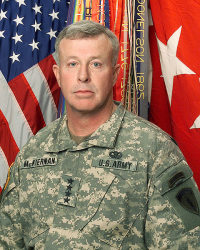
 |
|
|
||
|
David D. McKiernan |
||||
|
Engagements: • Gulf War (1990 - 1991)• Afghanistan War (Operation Enduring Freedom) (2001 - present)• Iraq War (Operation Iraqi Freedom) (2003 - 2011) |
||||
| Biography: | ||||
|
David D. McKiernan David D. McKiernan was born on 11 December 1950 in Atlanta, GA. He graduated from the College of William & Mary with a Bachelor of Arts degree in History in 1972. He was commissioned from the Reserve Officers' Training Corps and entered active duty in 1972 as a Second Lieutenant of Armor. He holds a Master of Public Administration degree from Shippensburg University and an honorary doctorate in Public Service from William & Mary. His commands have included: 1st Battalion, 35th Armor (Iron Knights), 1st Armored Division, 1988-1990; 1st Brigade (Iron Horse), 1st Cavalry Division, 1993-1995; 1st Cavalry Division, 1999-2001; Third U.S. Army/Combined Forces Land Component Command, 2002-2004. Seventh U.S. Army/U.S. Army Europe, 2005-2008 International Security Assistance Force (ISAF) and United States Forces-Afghanistan, 2008-2009 McKiernan served in the VII Corps Headquarters during the First Gulf War (Liberation of Kuwait) and then as the G-3 in the 1st Cavalry Division (about 1992-93) in the rank of Lieutenant Colonel. The first of these appointments was probably his first experience of working with other officers or formed units of other nationalities; in the second he had British Exchange Officers on his staff. He gained experience in the Balkans as a staff officer in the 1990s. In July 1996, he joined the Allied Command Europe Rapid Reaction Corps (ARRC), serving as the Deputy Chief of Staff G-2/G-3, forward deployed in both Sarajevo, Bosnia-Herzegovina and Rheindahlen (Mönchengladbach), Germany. From August 1998 until September 1999, he served as Deputy Chief of Staff, Operations, Headquarters, U.S. Army, Europe and Seventh Army during a period of simultaneous operations in Bosnia, Albania, and Kosovo. In 2001, he was assigned as G-3 (Operations), Headquarters, Department of the Army. Following that posting, in September 2002, Lieutenant General McKiernan assumed command of the Third U.S. Army and U.S. Army Forces Central Command (ARCENT), and became the Coalition Forces Land Component Commander for U.S. Central Command in preparation for Operation Iraqi Freedom. In March 2003, McKiernan led all coalition and U.S. conventional ground forces that attacked Iraq to remove Saddam Hussein from power. Following his assignment as ground forces commander, McKiernan was assigned as Deputy Commanding General/Chief of Staff for U.S. Army Forces Command, the largest major command in the U.S. Army, which is responsible for the readiness and deployment of Army forces based in the U.S. Then he assumed command of Seventh Army/U.S. Army Europe. He was then assigned in Afghanistan as Commander, International Security Assistance Force (ISAF) and U.S. Forces-Afghanistan from 3 June 2008 to 15 June 2009. U.S. Secretary of Defense Robert Gates met with McKiernan in Afghanistan on 6 May 2009. Gates announced McKiernan's replacement on 11 May 2009. McKiernan's replacement was Lieutenant General Stanley A. McChrystal. The Washington Post called it a "rare decision to remove a wartime commander." The Washington Post described the replacement as one of several replacements of generals who represented the "traditional Army" with generals "who have pressed for the use of counter-insurgency tactics." McKiernan retired from the Army with full honors on 15 July 2009. Secretary Gates praised him for his leadership at every military level and presented him with the Defense Distinguished Service Medal for his service. He also received the Army Distinguished Service Medal from his retirement ceremony host, Army Chief of Staff, General George W. Casey, Jr. Medals, Awards, Badges & Tabs Defense Distinguished Service Medal with Bronze Oak Leaf Cluster Iraq War Troop-Levels Debate In their book, Cobra II, military historians Michael Gordon and Bernard E. Trainor suggest that McKiernan was unhappy to hear of the cancellation of the deployment of the 1st Cavalry Division, a 17,000-soldier force that was scheduled to arrive in Iraq as a follow-on reinforcement. Its deployment was cancelled on 21 April 2003 after U.S. Defense Secretary Donald Rumsfeld raised the issue of whether it was needed. Previously, shortly before the war, McKiernen won Pentagon approval for a new war plan that increased the number of ground troops, calling the new war plan COBRA II. During Operation Iraqi Freedom, he had a different view of the battlefield than his superior, General Tommy Franks. McKiernan saw the Saddam Fedayeen fighters as a major threat and one of the "centers of gravity" in Iraq, while Franks dismissed the importance of the irregulars. The military was also surprised when McKiernan and his staff were not given command of post-war operations in Iraq, which instead went to V Corps and the newly-promoted Lieutenant General Ricardo Sanchez. Germany and Targeted Killing In a 2008 interview by Der Spiegel, McKiernan was asked whether Germany was a particularly difficult ally because its government requested limitations on its soldiers' deployment in Afghanistan, feeling that it might violate Germany's constitution if they were to conduct a targeted killing, in the absence of a direct attack. McKiernan responded: "If ... the decision has been a legal and political decision back in Germany ... I accept that. But as a soldier, I don't understand it. I don't understand ever putting your men and women in harm's way, without their having the full ability to protect themselves. That also means operating on actionable intelligence to defeat insurgents, and protect your forces. That's how you keep your soldiers alive." |
||||
| Honoree ID: 282 | Created by: MHOH | |||
Ribbons
Medals
Badges
Honoree Photos
 |  |  |
 |  |
 |


